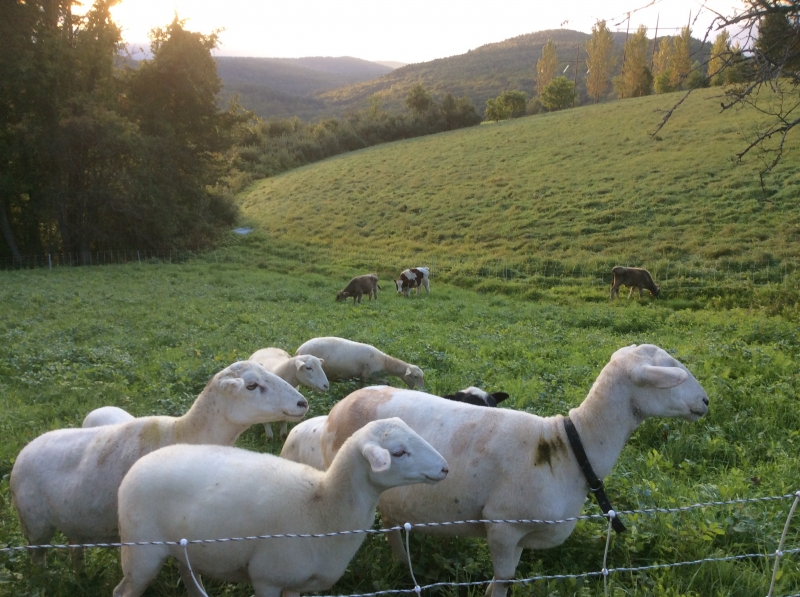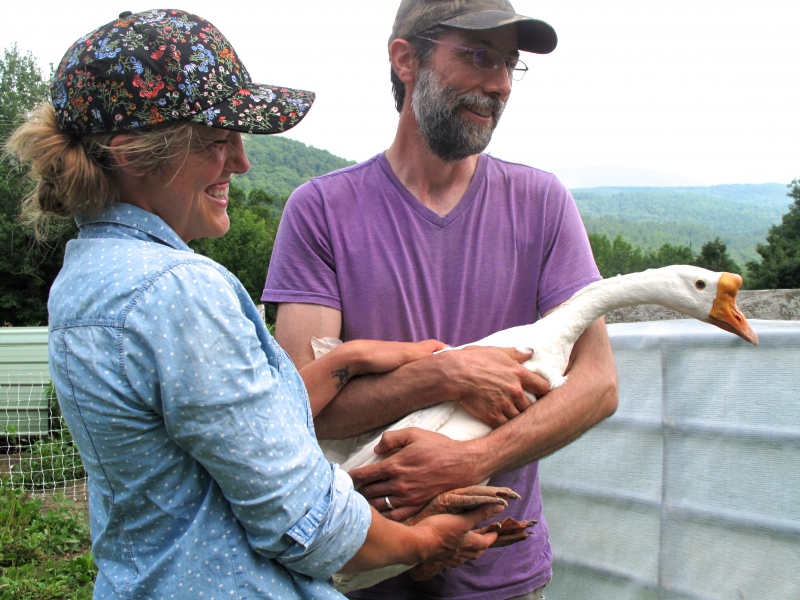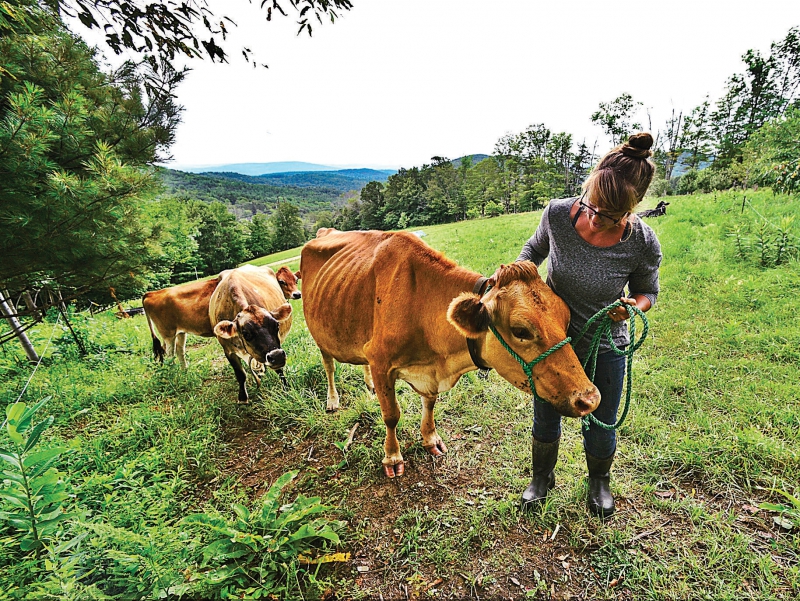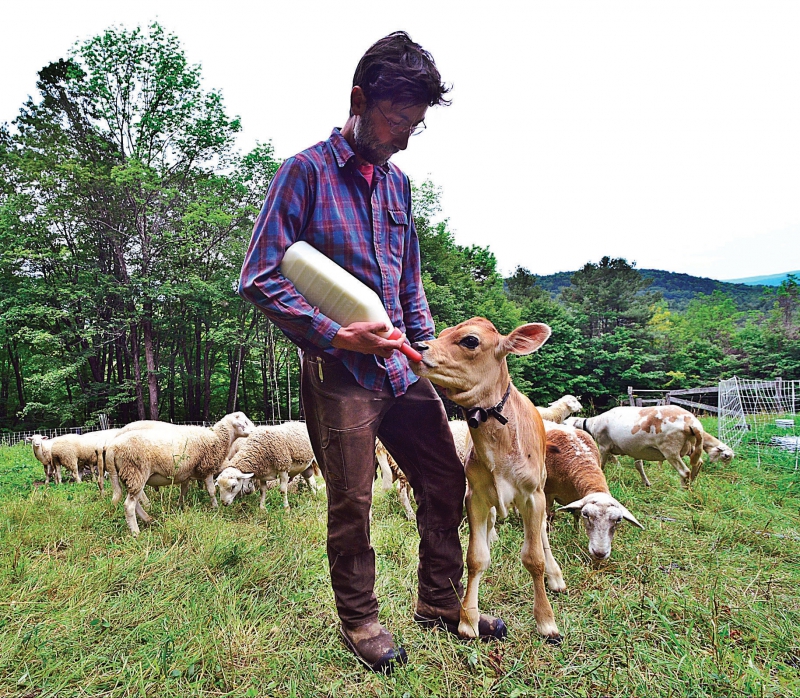By Cicely M. Eastman
Ashlyn Bristle and Abraham McClurg are a beacon of hope for Vermont’s agricultural industry. At a time when many of the state’s youth are leaving the state to seek careers in urban areas, Ashlyn and Abraham are of a new breed of young farmer moving to Vermont, establishing Rebop Farm CSA on Sunset Lake Road in Brattleboro.
For Ashlyn it was to follow a dream. For Abraham it was life’s purpose found.
Ashlyn, from North Carolina, developed an interest in farming in college as an art major when taking a cheesemaking course. Graduating during the economic downturn in 2008, she found there were no art teaching jobs around. Looking for a nontraditional way to make a living, she took a job at Farm & Wilderness in Plymouth. There she discovered Vermont as a farming paradise.
Abraham was no stranger to an agricultural lifestyle, having lived on a farm before moving to Seattle when he was 8. As an adult, he pursued several career options: culinary school, a degree in photography, and a real estate company in Chicago. “I was searching for a purpose,” he said. “Then I met Ashlyn.”
The couple met at a contra dance in Amherst, Mass., something they continue to enjoy doing at Guiding Star Grange in Greenfield, Mass.
“He took to farming like a duck to water,” Ashlyn said.
Rebop Farm CSA, a meat CSA, (for community-supported agriculture) is not the sort of farming choice one would expect from former vegetarians. But Ashlyn and Abraham found it wasn’t eating meat that disturbed them as much as it was the way the animals are raised in confinement systems with concentrated feeding operations. Instead, Rebop promotes a healthy diet sourced through ethical and humane practices. Most of their customers are families who want high quality animal products that are pastured and grass-fed. The experience of visiting the farm and seeing where their food is coming from is a meaningful experience.
“We occasionally have customers that don’t go with us because we are not organic-certified,” Ashlyn said, “but we grow with organic practices.”
While they are organic in practice, as a smaller farm it doesn’t make sense for them to become certified because it would require them to permanently remove a cow from their herd if it needed antibiotic treatment. Even though no milk is ever sold from a cow with any trace of infection or antibiotics in its system, removing even one cow from their small herd would upset their balance of production. Besides, they are attached to their cows and can’t bear to be forced to give any away. This humane and loving treatment of their animals is why consumers join Rebop’s CSA.
The CSA offers eight kinds of meat—rabbit, duck, lamb, chicken, rose veal, pork, turkey, and a limited amount of beef—as well as honey, maple syrup, and raw milk. They offer a winter CSA and summer CSA from a choice of three different sized boxes. Customers receive a mixed box once a month that they pick up at the farm store annexed to Ashlyn’s and Abraham’s home. This year Rebop is launching a pilot program, a Flex Share CSA, in which the money for CSA may be used at the store instead.
By next December, nearer the bottom of their long and winding driveway, the couple expect to have a larger farm store thanks to a grant from the Vermont Agency of Agriculture’s Working Lands Grant Initiative, to be built on the foundation of a building that burned in 1942.
It isn’t always easy being a farmer. When looking to relocate from their first farm in Newfane they knew they wanted to remain in Southern Vermont but there weren’t many properties that were affordable and farmable.
“Our hearts are here. And we needed to be near a populated town to make a living selling such items as raw milk,” Ashlyn said.
The hilly property destined to become the Rebop Farm was too steep for row farming, but that made it affordable. With the land in its fourth growing season, Ashlyn utilizes soil building techniques to combat soil erosion. Only a quarter acre of the farm is open soil at any one time while the rest is covered with hay or mulch, compacting soil through management. But because it is also too steep for logging, it is home to an old wood stand full of maple trees that produce great syrup.
It is tricky working with someone you live with, something Ashlyn and Abraham have made work. They seem to hold hands at every opportunity. The Vermont Viability Program helped them learn how to work as a team, each bringing their particular talents to the table. Ashlyn deals with birthing, learns how to improve efficiency, is enrolled in the Farm Viability Program, and is taking online classes at the University of Massachusetts for a second bachelor’s degree, in soil and pasture management. Abraham learns from Ashlyn, does the bookkeeping, and maintains the equipment —for which Ashlyn says she’s eternally grateful.
As if they are not busy enough, they offer workshops on subjects they wanted to learn when they first started farming: cheesemaking, meat cookery, fruit tree pruning, beekeeping, fermentation, pasta making, sausage making and charcuterie, and home slaughter and butchery for homesteaders.
They regularly hold intimate house concerts for fellow folk music aficionados, host fundraisers to finance their share of Northeast Farming Organic Association’s farm share programs that help low-income people join CSAs, and participate in farm tours during June’s Strolling of the Heifers and August’s Open Farm Week. A pig roast on June 15 features chef Nicole Norsworthy.
They admit the hardest part is that there is no break, no vacations. But for all that, they’re never bored. And Ashlyn, who says she gets bored easily, says she finds the work satisfying.
When asked what do they do for fun, they agreed: “We farm!”
For more information, visit http://www.rebopfarm.com or http://www.facebook.com/BebopaRebopa.

























































